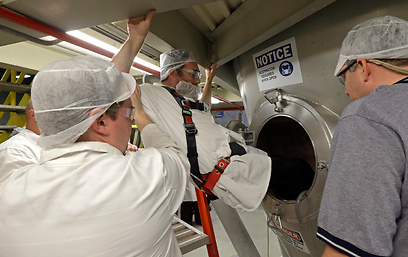
Kosher meets industrial food at enzymes
Centuries-old dietary code of observant Jews is adapting to modern food technology while kosher is increasingly being used as mark of quality in global food, drinks industry
For 10 minutes, the 47-year-old from Raleigh, North Carolina, runs his thumb along corners of the stainless steel tank and scans screens with his flashlight. He's checking whether the equipment is clean enough to make a product for sweeteners that can be declared kosher for the Passover holiday.
"Just checking for any possible residue from the prior product. The thing it comes to with various raw materials, it is difficult to get it fully removed," he said. Later, he'll stand in the control room watching the rising temperature of water being circulated through the equipment to clean it.
The inspection is an example of how the centuries-old dietary code of observant Jews is adapting to modern food technology and how kosher is increasingly being used as a mark of quality in the global food and drinks industry.
Herman's work at the Danish-owned Novozymes plant includes near-daily visits to a Durham supplier. There he checks that overseas deliveries arrive with unbroken seals set by rabbis abroad. Herman then checks that the preservatives extending shelf life and stabilizers controlling pH balance are properly repackaged for the short trip to Franklinton, about 25 miles (40 kilometers) north of Raleigh.

Rabbi Herman wears harness for safety while being lowered to inspect machinery used for enzyme production for kosher products (Photo: AP)
Besides the duties of his congregation, Herman roams the eastern half of the state, investigating components of the food chain ranging from citric acid to chemicals that may line the inside of a can of green beans.
"Somebody's going all the way. They start from the beginning of whatever the process is," said Herman, who was dispatched to Novozymes by the New York-based Orthodox Union, the country's largest kosher certifying organization.
Kosher describes foods that meet dietary laws, based in the Old Testament, on what is fit for people to eat. The dietary laws predominantly deal with three issues. Some animals like cattle and finned fish are allowed, while others like pork and shellfish aren't. Blood must be drawn out of meat before it's eaten. Meat and milk can't be mixed. There are many details, and rules are more stringent for Passover.
The rabbi's mission is to inspect and audit a food plant, not to bless the process or its products, said Joe Regenstein, a food science professor at Cornell University. They are checking materials used, the past uses of equipment, the piping and other process flow details, he said. Kosher adherence is likely to mean that a food producer will have to keep a detailed list of every ingredient used there, something that they might not otherwise compile.
US sales of kosher prepared foods top $12.5B
Nothing's perfect. A New York City kosher food producer saw its inventory seized in April after the US Food and Drug Administration found widespread rodent infestation. But millions of US consumers like the idea that someone besides government food inspectors is checking their food.
US sales of kosher prepared foods, meat, fish and dairy topped $12.5 billion in 2008, according to market research firm Mintel. That was projected to grow by this year to about $15.3 billion as more and more existing products join Oreo cookies and Tootsie Rolls candy in becoming certified, the firm said.
While only about one out of eight Americans bought kosher products, 62% who did reported that the main appeal was food quality, according to a 2009 Mintel consumer survey. Just 14% of respondents said their purchases were because they follow kosher religious rules, the survey said.
"It is a quality mark, in the sense that these are companies that are making a commitment to follow some very esoteric laws that have a great deal of detail in terms of operational procedures," Regenstein said.
Mike Ciunci of Berlin, Connecticut, says the kosher label is great for people with food allergies or those like him who are concerned about processed foods. A vegetarian who says he tries to eat as carefully as he can without obsessing, Ciunci says he looks for kosher and organic labels when shopping.
During Passover, Ciunci looks for the kosher version of Coca-Cola sweetened with sugar instead of high-fructose corn syrup. Many observant Jews do not use products made with corn during the holiday.
Kosher certification offers a model of private-sector food regulation for consumers who worry about food safety and question food labels such as "natural" or "healthy," said Timothy Lytton, the author of the new book "Kosher: Private Regulation in the Age of Industrial Food."
Lytton compares kosher labeling to other marks of quality, such as "fair trade," `'environmentally sustainable," and "cruelty-free." Some consumers welcome additional checks now that food is a complex global enterprise in which ingredients come from everywhere and finished goods are sold everywhere, said Lytton, who is a professor at Albany Law School and an Orthodox Jew who keeps kosher.
The modern kosher certification system has a number of key elements that increase reliability, he said. Sufficient consumer demand makes companies willing to open up their operations to kosher inspectors and to pay for certification. Kosher certifiers compete for food company clients by developing brands based on reliability, countering incentives to cut corners and ease up on producers.
Certifying agencies keep an eye on each other, which reduces mistakes. Finally, a core of vigilant kosher consumers double-checks supermarket labels and reports problems back to the certifiers.
"The system is not perfect," Lytton said, "but it does show that private regulation can be an effective way to assure consumers that the food standards and labels that they rely on are more than just marketing."










